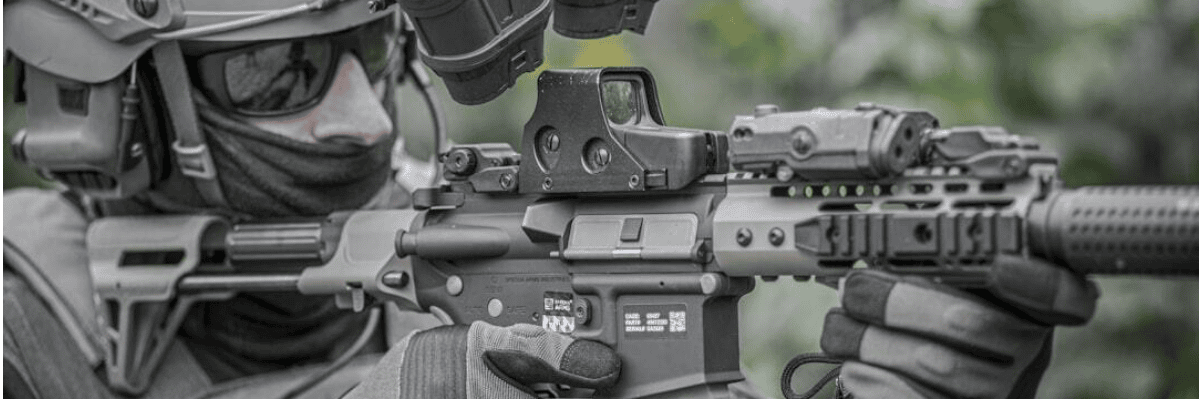Best Defense or War Stocks in Canada
You know it’s not a great sign of the times when you start getting emails from Canadians about investing in war stocks. More politely referred to as defensive industry stocks, these are companies that sell weapons to governments around the world. You will sometimes hear them collectively referred to as the military-industrial complex.
While the Canadian government looks poised to join its European cousins in increasing their military spending to 2%+ of GDP over the next few years, that doesn’t necessarily mean that the spending will benefit Canadian companies. Truthfully, Canada doesn’t have a lot of “war stocks” as our defense industry isn’t a major part of the Canadian stock market. You won’t find any defense companies in our best dividend stocks in Canada list or as a Canadian Dividend King pick. (The closest is probably CAE.)
That said, given the billions of dollars that the Federal government is about to spend in the space, perhaps it’s worth a look at the main players.
What is a War or Defense Stock?
Whether we refer to companies in the weapons industry as “defense stocks” (defence stocks if you’re American) or war stocks, it doesn’t really change what they do. In order to qualify as a defense stock, a company has to derive a significant portion of their revenue from supplying products and services to military and defense sectors. These companies are integral to national security and often engage in contracts with government agencies to provide equipment, technology, and support services essential for military operations.
It’s important to distinguish between “defense stocks” and “defensive stocks.” While defense stocks are tied to the military and defense industry, the term defensive stocks is used to refer to stable companies such as Canadian blue chip stocks.
Investing in defense stocks can offer exposure to a sector that may benefit from increased government spending during times of geopolitical tension or conflict. Detractors of war stock investment would point out that it’s essential to consider the ethical implications of supporting the defense industry when evaluating such investments.
Top 3 Canadian Defense Stocks to Buy Now
As I pointed out above, there isn’t a whole lot to choose from in the Canadian stock market when it comes to defense stocks. You want pipeline stocks or utility stocks – we’ve got you covered. But defense stocks are more of an American thing. At the same time, we do have some corporations that are at least partially tied to defensive procurement contracts.
1) CAE Inc. (TSX: CAE): Headquartered in Montreal, CAE a global leader in simulation technologies and training services for civil aviation, as well as defensive aircraft. The company provides comprehensive training solutions to military forces worldwide, including flight simulators and operational support services.
With a market capitalization of approximately $10.38 billion, CAE has demonstrated consistent growth, with a 12% revenue increase and a 116% rise in operating income year-over-year. The company’s extensive global presence, with operations in over 35 countries gives it a level of diversification that is unusual in the military stock universe.
2) MDA Ltd. (TSX: MDA): MDA Ltd., based in Brampton, Ontario, specializes in space-based technologies, including satellite systems, robotics, and geo-intelligence. The company is renowned for developing the Canadarm series of robotic arms used on the International Space Station and is currently involved in the Canadarm3 project for NASA’s Lunar Gateway.
In addition to its civil applications, MDA’s expertise in space robotics and satellite communications makes it a vital contributor to defense and intelligence operations. With a market capitalization of approximately CAD 3.02 billion, MDA has shown impressive growth, with a 72% increase in stock value over the past year. It might be a bit of a stretch to call MDA a military stock, but it certainly could pivot that way if the Canadian government decides to direct contracts its way.
3) Bombardier Inc. (TSX: BBD.B): Headquartered in Dorval, Quebec, Bombardier is a leading manufacturer of business aircraft. While primarily focused on the civil aviation market, Bombardier’s aircraft are utilized in various defense roles, including surveillance and reconnaissance missions.
The company has a global fleet of over 5,000 aircraft and provides comprehensive support services. With a market capitalization of about $8.2 billion, Bombardier has experienced a 45.47% return over the past year, reflecting its strong performance in the aerospace sector.
Is the Canadian Defense Industry About to Grow?
In April 2025, Prime Minister Mark Carney unveiled a comprehensive defense strategy, pledging $30.9 billion in new military spending over the next four years. This initiative aims to meet NATO’s defense spending target of 2% of GDP by 2030. The Canadian Conservative has announced similar plans – so it appears to be a bipartisan consensus at this point.
The plan focuses on enhancing Arctic defense capabilities, including investments in submarines, icebreakers, drones, radar systems, as well as emerging technologies like AI and quantum computing. Additionally, the strategy emphasizes recruitment, personnel support, and infrastructure development in partnership with Indigenous communities.
Recent trade tensions have led to increased scrutiny of Canada’s reliance on American defense suppliers. For instance, the Canadian government is re-evaluating its planned purchase of F-35 fighter jets from the U.S., considering alternatives that may offer greater domestic production opportunities.
This shift could potentially bolster Canada’s defense industrial base and reduce vulnerability to external trade policies.? It might not be the most militarily-sound approach, but it would certainly lead to more positive spin-offs for Canadian employment metrics.
Globally, defense budgets are experiencing unprecedented increases. The International Institute for Strategic Studies reports that global defense spending reached $2.56 trillion USD in 2024 and is projected to rise to $2.68 trillion in 2025, marking a 4.9% annual growth rate. In theory this could mean increased opportunities for a company like CAE.
International Military Stocks to Consider
If you’re determined to get exposure to military stocks (not exactly a glass-half-full type eh?) then you might want to consider some of the international heavyweights such as:
Lockheed Martin (NYSE: LMT) stands as the world’s largest defense contractor, renowned for its development of the F-35 Lightning II fighter jet and leadership in missile systems, space technologies, and advanced defense electronics. The company’s extensive portfolio and consistent government contracts underscore its pivotal position in the defense industry.?
Northrop Grumman (NYSE: NOC) is another key American player in aerospace and defense, known for its work on stealth bombers like the B-21 Raider and contributions to nuclear deterrence and space exploration. Its focus on cutting-edge technologies positions it at the forefront of modern defense solutions.?
BAE Systems (LSE: BA), the UK’s largest defense company, offers a diverse array of products, including naval vessels, armored vehicles, and cybersecurity solutions. Its strong presence in both domestic and international markets highlights its global influence.?
Rheinmetall (FRA: RHM), based in Germany, specializes in military vehicles, munitions, and air defense systems. The company’s significant growth aligns with increased European defense spending and modernization efforts.? Obviously they’ve been in the news a lot lately given Germany’s massive new investment announcements.
Is there a Defense Stocks ETF?
Perhaps the easiest way for investors to get diversified exposure to the defense sector is through an exchange traded fund (ETF). I’d personally recommend comparing any of these to the better options on our Best Canadian ETFs list, but they’re worth a gander given the recent turn of events the last few years I suppose.
Note that none of these trade on the Toronto Stock Exchange (TSX).
iShares U.S. Aerospace & Defense ETF (ITA): This ETF tracks the performance of U.S. companies in the aerospace and defense sector, including major players like Lockheed Martin, RTX Corporation, and Northrop Grumman. With over $6 billion in assets under management, ITA offers investors targeted access to American aerospace and defense stocks. ?
Invesco Aerospace & Defense ETF (PPA): PPA is based on the SPADE Defense Index, which includes companies involved in the development, manufacturing, operations, and support of U.S. defense, homeland security, and aerospace sectors. Top holdings comprise Lockheed Martin, RTX, and Boeing. ?
SPDR S&P Aerospace & Defense ETF (XAR): XAR offers exposure to the aerospace and defense industry by tracking the S&P Aerospace & Defense Select Industry Index. This ETF provides a more balanced approach by giving equal weight to its holdings, which include companies like Curtiss-Wright, Axon Enterprises, and L3Harris Technologies. ?
Global X Defense Tech ETF (SHLD): SHLD focuses on companies positioned to benefit from the increased adoption of defense technology, including cybersecurity systems, artificial intelligence, and advanced military hardware. This ETF provides investors with more exposure to companies from the world in addition to American ones.
VanEck Defense UCITS ETF (DFNS): For investors interested in global defense exposure, DFNS tracks the MarketVector Global Defense Industry Index, encompassing companies involved in aerospace, communication systems, unmanned vehicles, and cybersecurity. As of April 2025, the ETF’s top holdings include ?Thales SA (France), ?Palantir Technologies Inc. (USA), ?Leonardo SpA (Italy) – 7.95%, ?Hanwha Aerospace Co. Ltd. (South Korea) – 6.91%, and ?Saab AB (Sweden) – 6.50%.
Q/A About Investing is Canadian Defense Stocks
Should I invest in Canadian war stocks?
Truthfully, investing in Canadian war stocks isn’t a very diversified strategy as there are so few companies available to consider. A broader investing strategy is likely the better bet.
What are the best Canadian defense stocks?
There isn’t really a company in Canada that is a pure military or defense stock. The top three Canadian defense stocks we refer to above all get some of their revenue from the defense industry, but a majority still comes from civilian sectors. Overall, CAE is probably the best Canadian defense stock at the moment.
What is the difference between defense stocks and defensive stocks?
Defense stocks are companies that have contracts with militaries around the world. They specifically sell hardware or services pertaining to national armed forces. Defensive stocks are referring to the defense of your portfolio (not your country). Consequently, they’re generally stable (one might say boring) companies with solid cash flow. You can read about a few in our best low risk investments article.
Are Canadian Defense Stocks Worth It?
Despite recent announcements of increased defense spending by the Canadian government, investors seeking opportunities in Canadian defense stocks may find the landscape less promising than they might have initially expected. While the commitment to bolster military capabilities is evident, the domestic defense sector remains relatively underdeveloped, offering limited avenues for direct investment.?
Even the three best defensive stocks that we outlined in this article do not bring in a majority of their revenues from military contracts.
The Canadian government’s pledge to allocate C$30.9 billion over the next four years aims to enhance national defense, with a focus on Arctic sovereignty and modernization of military equipment. However, in the past, much of this investment was directed toward procurement from foreign manufacturers. It remains to be seen if Canada can develop the industrial base to take these military investments and actually produce usable hardware!
Truthfully, I’d argue that Canadian investors would be better off sticking to boring old Canadian bank stocks or even Canadian mining stocks compared to defense stocks (if they want to scratch that active investing itch). If you really think there is an opportunity that hasn’t been appropriately valued in regards to increased military budgets around the world, an industry-specific ETF from a non-Canadian stock exchange is probably your best bet.










